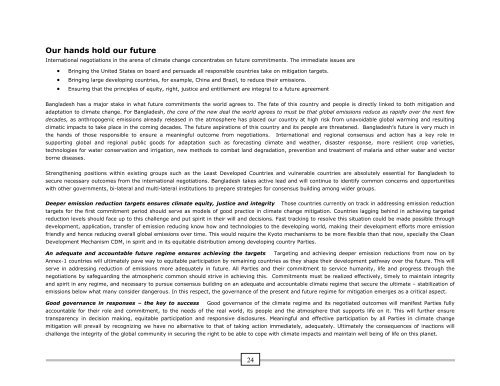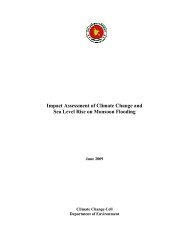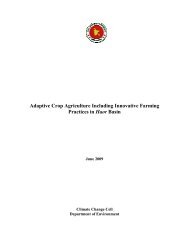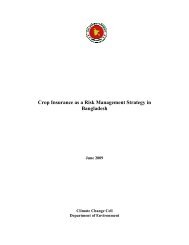CLIMATE CHANGE AND BANGLADESH
CLIMATE CHANGE AND BANGLADESH
CLIMATE CHANGE AND BANGLADESH
Create successful ePaper yourself
Turn your PDF publications into a flip-book with our unique Google optimized e-Paper software.
Our hands hold our future<br />
International negotiations in the arena of climate change concentrates on future commitments. The immediate issues are<br />
• Bringing the United States on board and persuade all responsible countries take on mitigation targets.<br />
• Bringing large developing countries, for example, China and Brazil, to reduce their emissions.<br />
• Ensuring that the principles of equity, right, justice and entitlement are integral to a future agreement<br />
Bangladesh has a major stake in what future commitments the world agrees to. The fate of this country and people is directly linked to both mitigation and<br />
adaptation to climate change. For Bangladesh, the core of the new deal the world agrees to must be that global emissions reduce as rapidly over the next few<br />
decades, as anthropogenic emissions already released in the atmosphere has placed our country at high risk from unavoidable global warming and resulting<br />
climatic impacts to take place in the coming decades. The future aspirations of this country and its people are threatened. Bangladesh’s future is very much in<br />
the hands of those responsible to ensure a meaningful outcome from negotiations. International and regional consensus and action has a key role in<br />
supporting global and regional public goods for adaptation such as forecasting climate and weather, disaster response, more resilient crop varieties,<br />
technologies for water conservation and irrigation, new methods to combat land degradation, prevention and treatment of malaria and other water and vector<br />
borne diseases.<br />
Strengthening positions within existing groups such as the Least Developed Countries and vulnerable countries are absolutely essential for Bangladesh to<br />
secure necessary outcomes from the international negotiations. Bangladesh takes active lead and will continue to identify common concerns and opportunities<br />
with other governments, bi-lateral and multi-lateral institutions to prepare strategies for consensus building among wider groups.<br />
Deeper emission reduction targets ensures climate equity, justice and integrity Those countries currently on track in addressing emission reduction<br />
targets for the first commitment period should serve as models of good practice in climate change mitigation. Countries lagging behind in achieving targeted<br />
reduction levels should face up to this challenge and put spirit in their will and decisions. Fast tracking to resolve this situation could be made possible through<br />
development, application, transfer of emission reducing know how and technologies to the developing world, making their development efforts more emission<br />
friendly and hence reducing overall global emissions over time. This would require the Kyoto mechanisms to be more flexible than that now, specially the Clean<br />
Development Mechanism CDM, in spirit and in its equitable distribution among developing country Parties.<br />
An adequate and accountable future regime ensures achieving the targets Targeting and achieving deeper emission reductions from now on by<br />
Annex-1 countries will ultimately pave way to equitable participation by remaining countries as they shape their development pathway over the future. This will<br />
serve in addressing reduction of emissions more adequately in future. All Parties and their commitment to service humanity, life and progress through the<br />
negotiations by safeguarding the atmospheric common should strive in achieving this. Commitments must be realized effectively, timely to maintain integrity<br />
and spirit in any regime, and necessary to pursue consensus building on an adequate and accountable climate regime that secure the ultimate – stabilization of<br />
emissions below what many consider dangerous. In this respect, the governance of the present and future regime for mitigation emerges as a critical aspect.<br />
Good governance in responses – the key to success Good governance of the climate regime and its negotiated outcomes will manifest Parties fully<br />
accountable for their role and commitment, to the needs of the real world, its people and the atmosphere that supports life on it. This will further ensure<br />
transparency in decision making, equitable participation and responsive disclosures. Meaningful and effective participation by all Parties in climate change<br />
mitigation will prevail by recognizing we have no alternative to that of taking action immediately, adequately. Ultimately the consequences of inactions will<br />
challenge the integrity of the global community in securing the right to be able to cope with climate impacts and maintain well being of life on this planet.<br />
24





